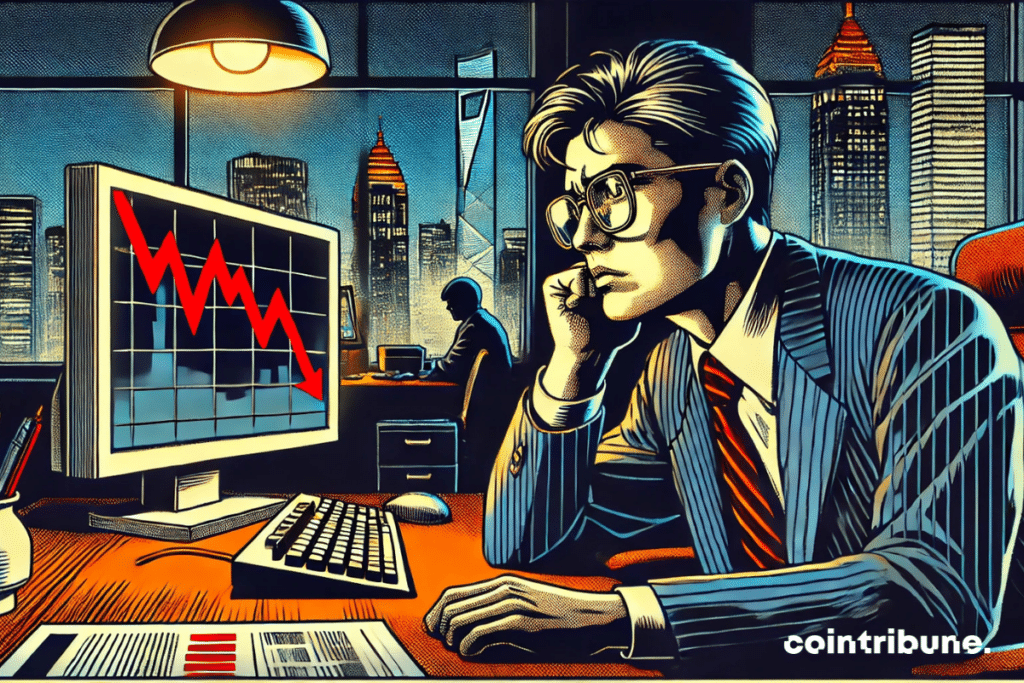Deflation And Uncertainty Put China’s Economy At Risk
The Chinese economy wavers between stagnation and decline, revealing enduring structural flaws. In December, the consumer price index rose by only 0.1 % year-on-year, confirming intensifying deflationary pressure despite the government’s repeated attempts to stimulate growth. The drop in food prices (-0.5 %) and consumer goods (-0.2 %) illustrates the lack of vigor in domestic demand, as households remain cautious and businesses hesitant to invest. Thus, the real estate crisis, coupled with the ineffectiveness of previous stimulus measures, fuels uncertainties. This slowdown goes beyond a cyclical phase. It questions the resilience of the Chinese economic model and its short-term prospects.

A Sluggish Inflation and the Threat of a Prolonged Slowdown
The year 2024 ended on a gloomy note for the Chinese economy, marked by virtually nonexistent inflation. In December, the consumer price index increased by only 0.1 % year-on-year, following a meager rise of 0.2 % in November, according to the National Bureau of Statistics (BNS). This stagnation reflects a dwindling domestic demand, particularly evident in the food sector, where prices fell by -0.5 %, and in consumer goods, down by -0.2 %. “The deflationary pressure persists,” notes Zhiwei Zhang, chief economist at Pinpoint Asset Management. He adds that the current dynamics are insufficient to reverse the trend.
This decline in prices fits within a context of economic fragility. For several months, China has struggled to shake off the specter of deflation, a consequence of lackluster consumption and a climate of uncertainty weighing on investments. Throughout the year, average inflation was limited to 0.2 %, a historically low level that heightens concerns. This phenomenon goes beyond a mere slowdown in prices. It directly threatens the country’s growth. Prolonged deflation reduces corporate margins, hinders consumption, and increases the burden of debts through rising real value. Such a situation recalls Japan’s deflationary trap in the 1990s, a period during which the archipelago sank into stagnant growth and a price decrease spiral.
Insufficient Stimulus Measures in the Face of Economic Uncertainties
Faced with critical economic indicators, Beijing has intensified its efforts to stem the slowdown. The government has adopted a series of measures, including interest rate cuts, easing for real estate purchases, and raising local government debt limits. The objective is clear: to stimulate consumption and encourage investment. Yet, these initiatives struggle to produce the expected effects. Households remain cautious in the face of economic uncertainty, and businesses are still hesitant to invest. Domestic demand remains fragile, hindering the recovery.
In response to this inertia, Beijing has announced an “even more active” fiscal policy for 2025, focusing on increased public spending and a widening budget deficit. This strategy aims to support the economy by compensating for the weakness in private consumption. However, its effectiveness raises questions. Many economists believe a more targeted stimulus, particularly for households, would be necessary to trigger a real rebound. The idea of a direct boost to purchasing power has been discussed for a long time, but Beijing remains reluctant to adopt such measures.
Some economic forecasts do not favor a rapid return to growth. The International Monetary Fund (IMF) anticipates a limited growth of China’s GDP to 4.8 % in 2024, followed by a slowdown to 4.5 % in 2025. If these estimates are confirmed, China could enter a prolonged phase of sluggish growth, a scenario that would test the robustness of its economic model. Additionally, there is an intensified crisis in the real estate sector, an essential pillar of activity, whose recovery is slow to materialize. For Beijing, the challenge now is to find a credible stimulus lever without undermining its budgetary and financial balances further.
China finds itself at a decisive crossroads. Despite ambitious stimulus measures, domestic demand remains fragile and growth struggles to rebound. The effectiveness of the announced fiscal policy for 2025 remains uncertain, while economic projections suggest a lasting slowdown. If Beijing fails to restore the confidence of households and businesses, the world’s second-largest economy could plunge into a prolonged stagnation, threatening its development model and overall economic influence.
Maximize your Cointribune experience with our "Read to Earn" program! For every article you read, earn points and access exclusive rewards. Sign up now and start earning benefits.
Diplômé de Sciences Po Toulouse et titulaire d'une certification consultant blockchain délivrée par Alyra, j'ai rejoint l'aventure Cointribune en 2019. Convaincu du potentiel de la blockchain pour transformer de nombreux secteurs de l'économie, j'ai pris l'engagement de sensibiliser et d'informer le grand public sur cet écosystème en constante évolution. Mon objectif est de permettre à chacun de mieux comprendre la blockchain et de saisir les opportunités qu'elle offre. Je m'efforce chaque jour de fournir une analyse objective de l'actualité, de décrypter les tendances du marché, de relayer les dernières innovations technologiques et de mettre en perspective les enjeux économiques et sociétaux de cette révolution en marche.
The views, thoughts, and opinions expressed in this article belong solely to the author, and should not be taken as investment advice. Do your own research before taking any investment decisions.